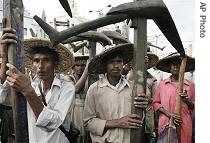-
(单词翻译:双击或拖选)
New Delhi
28 January 2007
India is reviewing its plan to establish special economic zones after growing protests from farmers who say they are being displaced from their lands. Anjana Pasricha takes a look at the controversy1 from New Delhi.
 |
| Farmers demonstrate against West Bengal state government's move to use agricultural land for industrialization, in Calcutta (File) |
These industrial parks were envisaged2 as havens3 for domestic and foreign investors4. They would offer tax breaks and world-class infrastructure5 in a country where everything from power to roads is in short supply.
Hundreds of businesses immediately rushed to take advantage. Twenty-four zones have already been established, 63 more have been approved, and many others are in the planning stages.
But after 11 months, the policy is mired6 in controversy. Critics complain that the zones are taking away agricultural land and displacing farmers, often without paying them adequate compensation or helping7 them to find a new way to make a living.
Observers say the controversy highlights the dichotomy in India, where manufacturing and service industries are powering ahead, while 70 percent of the population still lives in the countryside and depends on the land for its livelihood8.
The intensifying9 opposition10 both from farmers and politicians has forced a rethink on the government's part.
Industry and Commerce Minister Kamal Nath announced recently that the government will not approve any new projects until it gathers more information on the impact of the existing zones.
Nath says farmers must receive justice and correct compensation whenever the government takes over their land. He says the government is examining the issues surrounding land and resettling or compensating11 farmers.
The issue came into sharp focus earlier this month after five people were killed in violent protests against a 5,800-hectare economic zone being established in West Bengal state. Hundreds of enraged12 farmers and activists13 say the farmers have neither been properly compensated14 for their land, nor offered any help in finding a new means of livelihood.
Farmers in the western state of Maharashtra, have also vowed15 not to give up their land.
Farmers are not the only ones who are worried about the economic zones. The Finance Ministry16 has expressed fears that many businesses will move to tax-free zones, resulting in substantial revenue losses for the government.
But officials argue that the factories in industrial zones will provide much-needed jobs in rural areas where millions remain unemployed17 or underemployed, despite the booming national economy.
The Commerce Ministry estimates that the economic zones will attract $13.5 billion in investment and create nearly a million jobs by 2009.
It is not a new concept. India is borrowing the idea from China, where a small number of such zones have been used to attract investment.
 收听单词发音
收听单词发音
1
controversy

|
|
| n.争论,辩论,争吵 | |
参考例句: |
|
|
|
2
envisaged

|
|
| 想像,设想( envisage的过去式和过去分词 ) | |
参考例句: |
|
|
|
3
havens

|
|
| n.港口,安全地方( haven的名词复数 )v.港口,安全地方( haven的第三人称单数 ) | |
参考例句: |
|
|
|
4
investors

|
|
| n.投资者,出资者( investor的名词复数 ) | |
参考例句: |
|
|
|
5
infrastructure

|
|
| n.下部构造,下部组织,基础结构,基础设施 | |
参考例句: |
|
|
|
6
mired

|
|
| abbr.microreciprocal degree 迈尔德(色温单位)v.深陷( mire的过去式和过去分词 ) | |
参考例句: |
|
|
|
7
helping

|
|
| n.食物的一份&adj.帮助人的,辅助的 | |
参考例句: |
|
|
|
8
livelihood

|
|
| n.生计,谋生之道 | |
参考例句: |
|
|
|
9
intensifying

|
|
| v.(使)增强, (使)加剧( intensify的现在分词 );增辉 | |
参考例句: |
|
|
|
10
opposition

|
|
| n.反对,敌对 | |
参考例句: |
|
|
|
11
compensating

|
|
| 补偿,补助,修正 | |
参考例句: |
|
|
|
12
enraged

|
|
| 使暴怒( enrage的过去式和过去分词 ); 歜; 激愤 | |
参考例句: |
|
|
|
13
activists

|
|
| n.(政治活动的)积极分子,活动家( activist的名词复数 ) | |
参考例句: |
|
|
|
14
compensated

|
|
| 补偿,报酬( compensate的过去式和过去分词 ); 给(某人)赔偿(或赔款) | |
参考例句: |
|
|
|
15
vowed

|
|
| 起誓,发誓(vow的过去式与过去分词形式) | |
参考例句: |
|
|
|
16
ministry

|
|
| n.(政府的)部;牧师 | |
参考例句: |
|
|
|
17
unemployed

|
|
| adj.失业的,没有工作的;未动用的,闲置的 | |
参考例句: |
|
|
|















